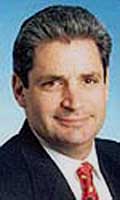By Andrew Haeg
Minnesota Public Radio
August 6, 2002
The St. Paul Companies CEO Jay Fishman spoke to business leaders Tuesday about his first year running the nearly 150-year-old insurance company. It was a year, Fishman said, full of potentially ruinous obstacles, including Sept. 11, a massive corporate restructuring, and a billion-dollar asbestos lawsuit settlement. But Fishman says the company is in good shape, and he's learned some hard-won lessons.
Last September, Jay Fishman was the number-two man at Citigroup, a financial services company based in New York City, and one of the nation's largest companies. He had a close relationship with the company's CEO Sandy Weill. Yet, he was thinking of leaving. Then came Sept. 11.
In the ensuing days, Fishman told local business leaders in Minneapolis that he walked to work, pondering his next move as he watched smoke billow from the ruins of the World Trade Center.
"It took several weeks for the odor of that event actually to finally clear from the air," Fishman said. "And you were constantly reminded of it. In the context of making personal changes, those were difficult times."
| |
|
|
|
||
On Oct. 9, Fishman agreed to take the top spot at the St. Paul Companies. It was a decision that, for the short term, would make for even more difficult times.
On Oct. 11, just two days after handing in his resignation at Citigroup, Fishman addressed employees at the St.Paul Companies as their new CEO. He arrived in St. Paul just as the impact of Sept. 11 was sending the insurance industry into turmoil.
The notion of risk changed completely when men decided to steer planes into buildings. Suddenly, Fishman says, insurance companies had to prepare for scenarios never before dreamed possible.
"We would read reports of potential atomic weapons being dropped in Midtown Manhattan," Fishman said, "and we would ask ourselves the question: What do we do about that? What do we do about small pox? What do we do about the kinds of issues that we were now being confronted with as a society, that in no way had been contemplated by people who take risk for a living?"
The process of refiguring risk after Sept. 11 led the St. Paul to stop insuring sports stadiums, and properties deemed possible targets.
Fishman offered up one story to demonstrate how Sept. 11 changed the company's behavior, with occasionally absurd results.
"We had insured the Double-A baseball team in Richmond, Vir., for as long back as the records in our company show," he said. "And I found out a few months back that we declined to renew the insurance on the Double-A baseball team. And I had to laugh, because first I thought that first the terrorists have to find out that Richmond even exists, and then after that they've got to go find the Double-A baseball team. There have got to be better targets than that."
Still, the Richmond Braves became, as Fishman says, one of the many casualties of St. Paul's quest to right itself.
Within two weeks of his arrival, Fishman announced a massive restructuring program at the St. Paul. At the time, the St. Paul, was the largest medical malpractice underwriter in the nation. Under the restructuring, the company would stop writing medical malpractice insurance. Doctors and nursing homes across the country scrambled to find insurance at ever higher rates, if they could find it at all.
|
"What do we do about the kinds of issues that we were now being confronted with as a society, that in no way had been contemplated by people who take risk for a living?"
- St. Paul Companies CEO Jay Fishman |
Fishman also announced that most of the St. Paul's international operations would have to go. The company began cutting what would become a total of 1,200 jobs.
Fishman said he had to shake up the company, but he agrees he might have been a little overzealous.
"While I certainly didn't want to send everyone into a panic about how important it was to make these changes, what I did want to do was to dispel the sense of contentment and the feeling was OK, "Fishman said. "Now if I had it to do all over again, I might have been a little bit gentler and easier in those early days."
Through the winter and early spring, Fishman worked to make the St. Paul whole again. But then another disaster shook the company.
In June, The St. Paul agreed to pay a firm called Western McCarthur $1 billion before taxes to settle an asbestos-related lawsuit. The payout sent the St. Paul's stock tumbling.
But besides the asbestos claim, Fishman says business was remarkably good. The St. Paul was raising premiums, and fetching top dollar for large property insurance contracts. And, subtracting the asbestos lawsuit, the company's earnings were better than ever.
Success is hardly certain, and the St. Paul still needs to raise money in an extremely tight capital market. Regardless, Fishman is, to a degree, proclaiming victory.
Though the past 10 months are not ones he'd like to repeat. "It's like the Marines, he said, "it builds character, but you only want to do it once."
Within three years, Fishman wants the St. Paul to be the third largest property casualty insurer -- it is now number five.
Fishman says to do so, the company needs to take risks. But it is a chief irony of his job that, at the same time, he has to do everything in his power to avoid them.

